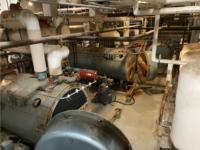The Dallas Federal Reserve predicts the oil and gas sector to cut capital spending by 15% in 2020, causing a surge of efficiency and overall industry consolidation by 2021. To combat this low-cost crude, Brian Sallade, CEO, Kinsmen Group suggests transforming major oil, gas, and utility companies through the adaptation of artificial intelligence and machine learning technologies. Under the digital transformation umbrella, digital twin technology improves operational insights, saves customers money, and gains them a competitive edge. A digital twin is a virtual or digital representation of a physical asset, article, or manufacturing practice.
Digital Twin Technology
Digital transformation can unlock approximately $1.6 trillion in value for oil and gas companies. “Digital Twins are a complete, 360-degree replica of a company’s physical assets — from pipelines, pumps, and gathering systems to heat exchangers, turbines, and compressors,” said Sallade.
These virtual counterparts are created as digitalized duplicates of machines, equipment, or physical sites using sensors in a virtual world before deploying them in the real world. This technology enables modeling of process, control, and monitoring of equipment health, acting as a live model before an asset is physically built.
Digital Efficiencies Translates to Business Growth
Digital twin technologies are used in high-risk industries and have different applications. PWC’s industry 4.0 survey measured the first movers’ advantages at 30% revenue increase while at the same time 30% cost reduction through utilizing historic data and advanced collaboration platforms. We’re identifying a trend where digital technologies can help disrupt the industry status quo to solve key business problems. This digital twin framework enables operational excellence by helping oil and gas operators quickly turn massive amounts of data into wisdom that generates real-time value, including predicting asset failure, uncovering hidden revenue opportunities, and providing continuous improvement for heightened competitiveness.
These trends coincide with “The Digitalization of Everything” as more tasks will eventually be automated offshore.
Staying Ahead of Pitfalls Before Disaster Strikes
Industry challenges, such as oil and gas supplies, demand, prices, layoffs, and investments, can fluctuate wildly. Digital twins can help companies overcome the restrictions of their aging infrastructure by optimizing their current technology and increase the production of new rigs.
That’s why more companies are now looking toward a digital transformation to drive more effective capacity, optimize operations, improve asset availability, achieve greater scalability, obtain shorter lead times, and obtain more rapid response to ever-changing market conditions. Implementing a digital twin strategy and getting in front of any potential pitfall or danger before disaster can strike is paramount. Thus, the race to digital transformation among the industry giants is underway.




